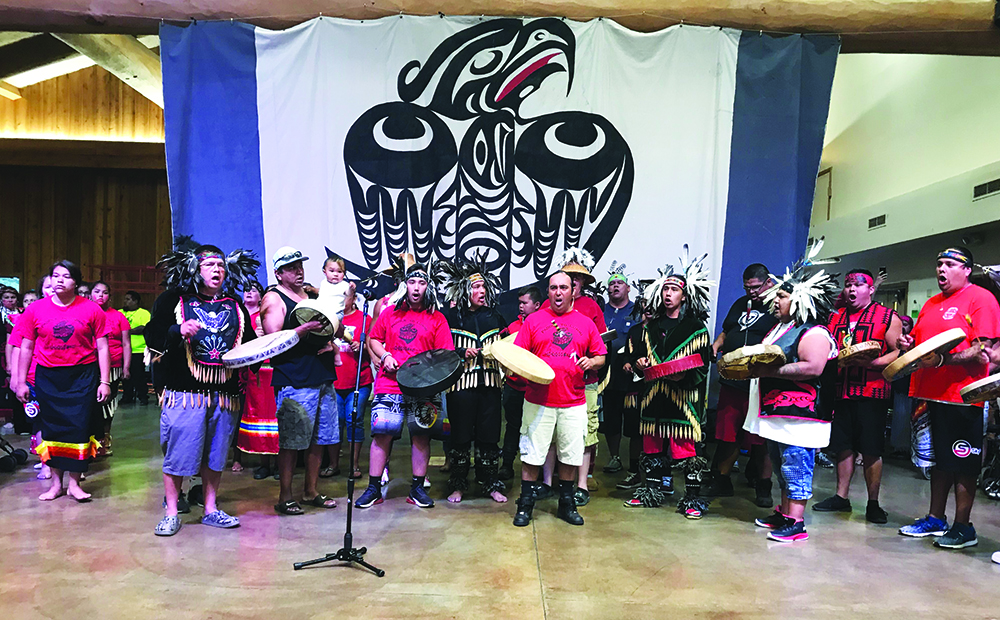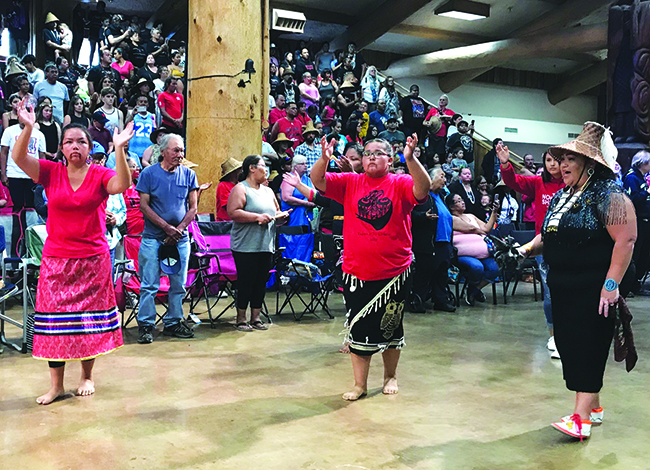By Kalvin Valdillez, Tulalip News

After spending several weeks on the water, resting at each tribal village along the way, over one hundred canoes landed at the Lummi Nation on the morning of July 24. The yearly summertime Canoe Journey is a popular occurrence in the Northwest as Coast Salish tribes and First Nation Bands travel the sacred waters in honor and celebration of Indigenous culture. Each year both tribal and non-tribal Washingtonians marvel at the beauty of the traditional cedar canoes as they navigate the Salish Sea. Thousands of photos are shared by news teams across social media as the canoes land at local tribes, but what’s not often shared are the events the take place for an entire week after the canoes reach their final destination during a series of potlatches known as protocol.
Lummi’s Wex’liem Building filled up quickly and was often at overcapacity during this year’s five-day protocol. Nearly seventy tribes shared their medicine throughout the week, offering their traditional songs and dances with the people.
Before Lummi’s opening ceremony, canoe families filled their bellies with salmon and frybread. A face painting station was set up behind a large thunderbird curtain where people could get the iconic handprint painted across their face, bringing awareness to the Missing and Murdered Indigenous Women (MMIW) epidemic. At approximately 8:00 p.m., Lummi singers gathered at the front of the community building and began drumming, officially kicking off the 2019 Paddle to Lummi protocol.
“It’s an honor to host you as our guests. Our family and relatives coming to visit and share some healing,” expressed Lummi Nation Vice Chairman, Travis Brockie. “We planned this in under a year and we came up with four themes. The first one being MMIW and the prayers that we have for the ones that we lost over the years, the ones who are still missing and the family’s that are searching for that healing. The second theme is the opioid crisis that we’re facing, fighting the pharmaceutical companies to keep these drugs off our reservations. The addiction that it’s brought is tearing our people apart. Third one is child welfare. For our children in the foster care system, our children that are being shipped across the state, every tribe is affected by that. We’re working on bringing our kids home, the system is failing our people. We have an uphill battle to fight. The last theme we thought of is salmon and our habitat. Without salmon, who are we as Indigenous people? That’s our bloodline and that’s who we are. Without salmon I don’t know where we’d be. It devastates us when our people can’t harvest to put food on their table, to pay their bills, it impacts us.”

A number of canoe families then joined Lummi by performing six songs during the shawl presentation, paying tribute to the many communities within Native America including the elders, youth, women, men, two-spirited and the MMIW. During each song, a shawl was displayed on the floor, representing and honoring each community while Protocol MC Terrance Adams shared the meaning behind each shawl.
“The button shawl signifies our elders,” he explained. “The ones who paved the way for us, who taught us, who continue to teach us. For all of our elders that left us something to carry on, to teach our little ones. The woven shawl honors our men. Each and every day I continue to pray that we have good strong men who will raise our young men and teach them the right way. It’s important that we have positive male role models in our community. The next one is a silk fringe shall for our women, the givers of life, the true protectors. The ones who continue to give us that love and nourishment we need.
“We have the two-spirited shawl. Growing up in this life, especially on the reservation, we need to embrace each and every person who comes into these sacred homes. We are taught to welcome with open arms. The two-spirited community has a huge voice in our community. It is very powerful for someone to come forward and claim their true identity and feel good about who they are. The cedar shawl represents our kids. Those who are abused, missing, assaulted. Those young ones who are survivors, not victims. Our kids will continue to survive. It’s important for us to pave the way for our future, you’re making your ancestors and our people proud. The last shawl is for the MMIW. There’s many rez’s where we have things set against us where we can’t prosecute, we can’t protect our own women on Indian land. We have families that are still searching for their loved ones. Our women dance for those women who can’t dance today, who can’t dance tomorrow. We continue to take their legacy on, share their story and teach our young ladies.”
Following the shawl presentation, the Lummi singers and dancers honored the many women who have gone missing throughout Indian Country by conducting a powerful and moving song which included the tear-jerking lyrics; “every day and every night I pray, pray for you/I love and miss you, sister come home”.

Once the crowd finished drying their eyes, Bella Bella was the first tribe up to offer songs, dances, stories and gifts to both the people and the hosting tribe. One after another, for five days straight, tribes and bands took to the floor showcasing their regalia, headdresses and traditions with their fellow Canoe Journey families. The Tulalip canoe family demonstrated a number of their songs on the fourth day of protocol. Taking an active role in this year’s journey, the Tulalip Youth Council were in attendance, proudly singing, drumming and dancing while representing their Tribe.
“We raise our hands and give thanks to Lummi and its leaders,” expressed Tulalip tribal member Natosha Gobin. “Thank you for inviting us to join in this amazing celebration. We are the Tulalip canoe family. This year we only had a couple short stops, but we traveled together on Big Brother and Big Sister. We have a lot of youth with us, a lot of first time canoe pullers. We’re very grateful and humble to arrive safely to your waters.”
With thousands witnessing protocol in person and hundreds more enjoying at home via livestream, the weeklong event brought together several generations in the name of love for the culture. The Paddle to Lummi was a great experience for youth and elders alike and a perfect opportunity for pullers to take part in the traditional lifeways of the Coast Salish people. Young Quinault tribal member and first time canoe puller, Kamimi Papp, shared her experience about being out on the water as well as participating in protocol.
“When I first started dancing during protocol, I felt as if I was praying to a higher power,” Kamimi stated. “I felt like I was one with the drums, a spirit being guided through a story. It was truly addicting and mesmerizing. My first Journey was indescribable. There are no words to explain the way you feel while paddling the ancestral highways. The closest words I can come up with are freeing and therapeutic. While on a canoe you feel a bond with the people on it, even if you don’t know them. You feel like you’re the heartbeat of the canoe, when your paddle touches the water you are the blood which pushes the canoe forward. It was amazing to meet new people who made an impression of a lifetime in that short amount of time. I will never forget the people I met through Journeys.”
The 2020 Canoe Journey will be hosted at Nanaimo, B.C. For more information, please visit the Tribal Canoe Journeys Facebook page.